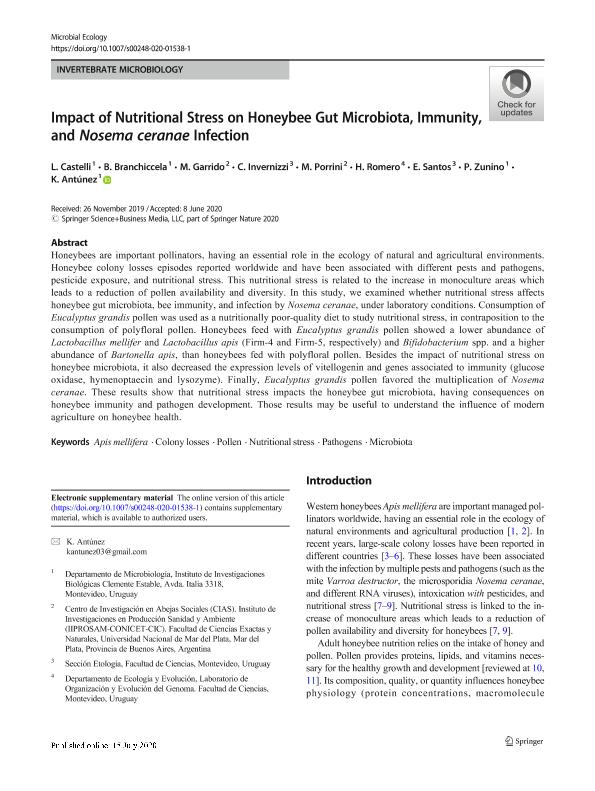Artículo
Impact of Nutritional Stress on Honeybee Gut Microbiota, Immunity, and Nosema ceranae Infection
Castelli, L.; Branchiccela, B.; Garrido, Paula Melisa ; Invernizzi, Ciro; Porrini, Martín Pablo
; Invernizzi, Ciro; Porrini, Martín Pablo ; Romero, H.; Santos, E.; Zunino, P.; Antúnez, Karina
; Romero, H.; Santos, E.; Zunino, P.; Antúnez, Karina
 ; Invernizzi, Ciro; Porrini, Martín Pablo
; Invernizzi, Ciro; Porrini, Martín Pablo ; Romero, H.; Santos, E.; Zunino, P.; Antúnez, Karina
; Romero, H.; Santos, E.; Zunino, P.; Antúnez, Karina
Fecha de publicación:
07/2020
Editorial:
Springer
Revista:
Microbial Ecology
ISSN:
0095-3628
Idioma:
Inglés
Tipo de recurso:
Artículo publicado
Clasificación temática:
Resumen
Honeybees are important pollinators, having an essential role in the ecology of natural and agricultural environments. Honeybee colony losses episodes reported worldwide and have been associated with different pests and pathogens, pesticide exposure, and nutritional stress. This nutritional stress is related to the increase in monoculture areas which leads to a reduction of pollen availability and diversity. In this study, we examined whether nutritional stress affects honeybee gut microbiota, bee immunity, and infection by Nosema ceranae, under laboratory conditions. Consumption of Eucalyptus grandis pollen was used as a nutritionally poor-quality diet to study nutritional stress, in contraposition to the consumption of polyfloral pollen. Honeybees feed with Eucalyptus grandis pollen showed a lower abundance of Lactobacillus mellifer and Lactobacillus apis (Firm-4 and Firm-5, respectively) and Bifidobacterium spp. and a higher abundance of Bartonella apis, than honeybees fed with polyfloral pollen. Besides the impact of nutritional stress on honeybee microbiota, it also decreased the expression levels of vitellogenin and genes associated to immunity (glucose oxidase, hymenoptaecin and lysozyme). Finally, Eucalyptus grandis pollen favored the multiplication of Nosema ceranae. These results show that nutritional stress impacts the honeybee gut microbiota, having consequences on honeybee immunity and pathogen development. Those results may be useful to understand the influence of modern agriculture on honeybee health.
Palabras clave:
APIS MELLIFERA
,
COLONY LOSSES
,
MICROBIOTA
,
NUTRITIONAL STRESS
,
PATHOGENS
,
POLLEN
Archivos asociados
Licencia
Identificadores
Colecciones
Articulos (IIPROSAM)
Articulos de INSTITUTO DE INVESTIGACIONES EN PRODUCCION, SANIDAD Y AMBIENTE
Articulos de INSTITUTO DE INVESTIGACIONES EN PRODUCCION, SANIDAD Y AMBIENTE
Articulos(CCT - MAR DEL PLATA)
Articulos de CTRO.CIENTIFICO TECNOL.CONICET - MAR DEL PLATA
Articulos de CTRO.CIENTIFICO TECNOL.CONICET - MAR DEL PLATA
Citación
Castelli, L.; Branchiccela, B.; Garrido, Paula Melisa; Invernizzi, Ciro; Porrini, Martín Pablo; et al.; Impact of Nutritional Stress on Honeybee Gut Microbiota, Immunity, and Nosema ceranae Infection; Springer; Microbial Ecology; 80; 4; 7-2020; 908-919
Compartir
Altmétricas



